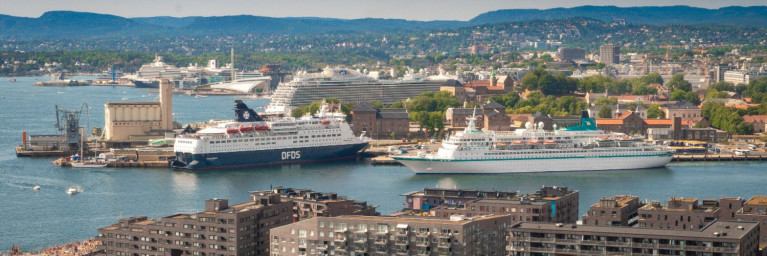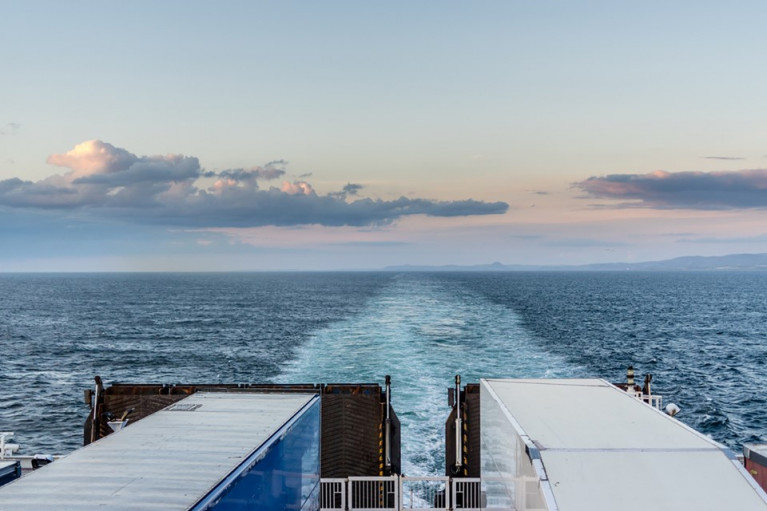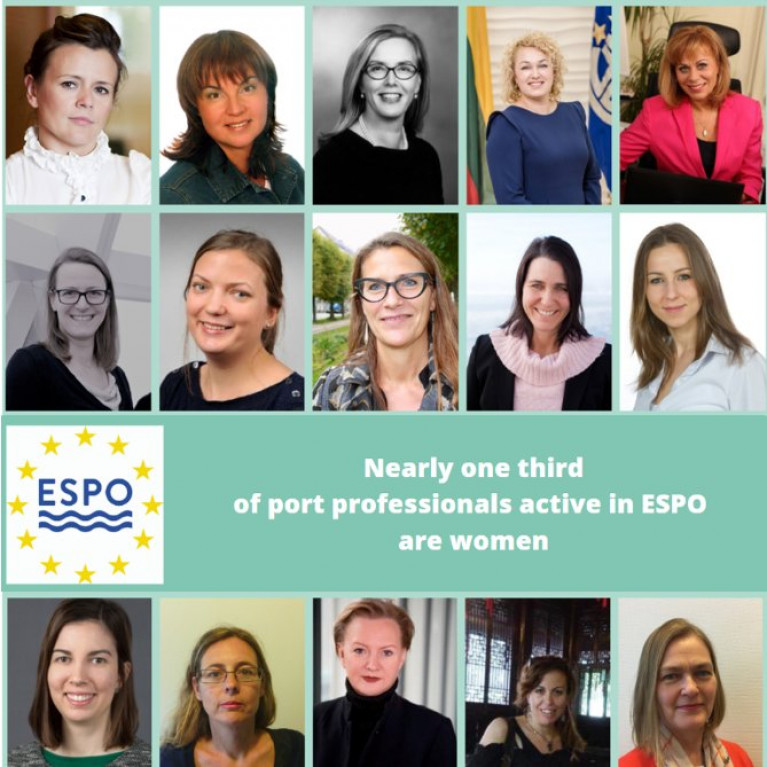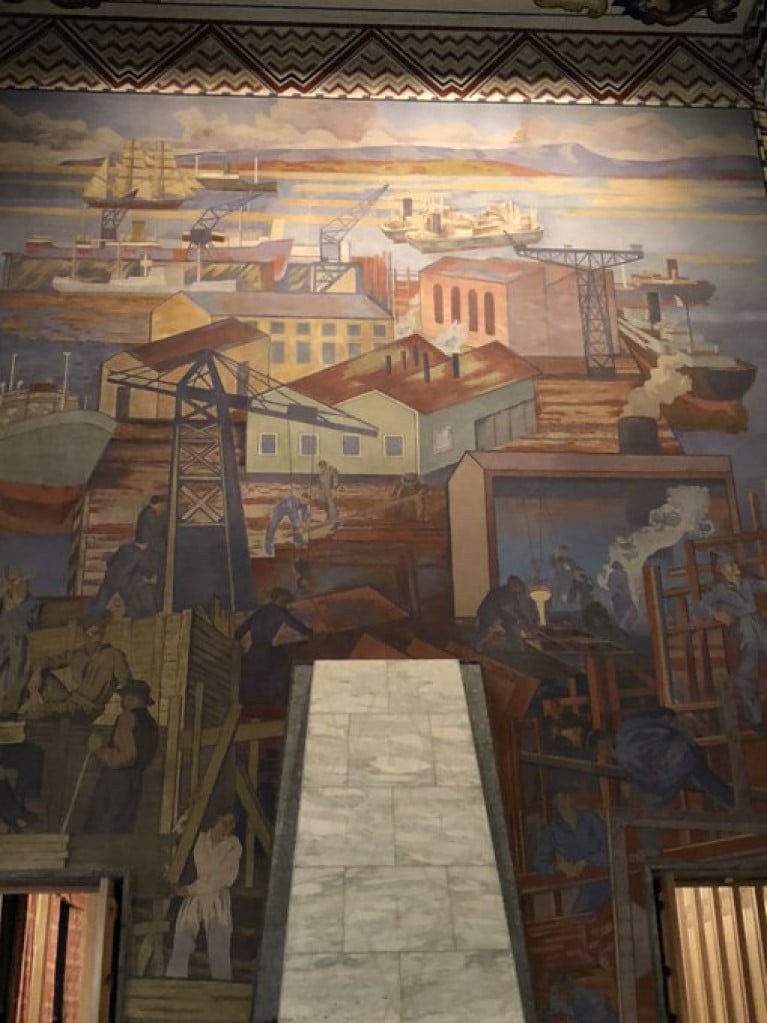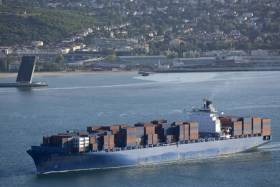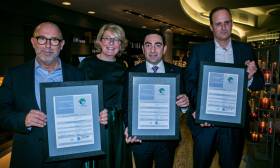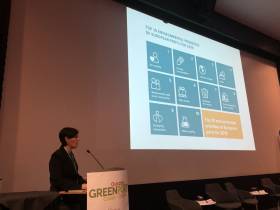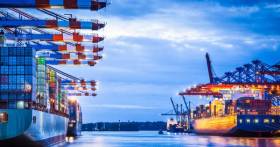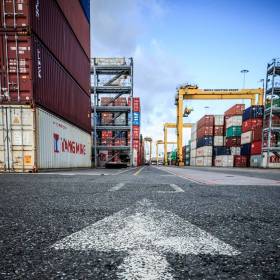Displaying items by tag: ESPO
European Sea Ports Organisation Conference Postponed to May 2021 with Venue Still in Norway
The European Sea Ports Organisation (ESPO) regret to inform that they feel obliged to cancel their Conference 2020, which was due to take place in one month in Oslo, Norway.
ESPO commented that this was a tough decision but in view of the current situation of the spread of Covid-19 among Europe and the different travel bans that will probably still be in place in May, in Norway as well as in many other EU Member States.
This being said, we would like to inform you that we will postpone our annual event to 2021, same place, same period! Pin the date in your calendar: 27 – 28 May 2021! With the Port of Oslo, we are really in good hands and we will keep all the good ideas of this year’s edition for 2021 and make it an even stronger version.
Ingvar M. Mathisen, Port Director/CEO of the Port of Oslo said: “ESPO 2020 is postponed, but not cancelled! We were really looking forward to hosting this conference and it is a pity that you will miss all the excellent speakers, but we will be back. We hope to see you all in Oslo next year end of May for an even better programme and networking event for the European ports.”
“We deeply regret that this annual tradition and gathering of European ports and the European port industry cannot take place this year. Since ESPO Conferences must be open and accessible for all ports and port stakeholders from all over Europe, which cannot be guaranteed in the next months, we decided to postpone the event to 2021. Moreover, in most European ports, it is now also all hands on deck to play their critical role in the supply chain and try to overcome this health and economic crisis. So, first things first. We are happy that a new date has been set already and that the Port of Oslo remains our enthusiastic host. We sincerely hope to see all our members, participants and ports back in Oslo in good health. We promise you a Conference edition that counts for two! In the meantime, we wish you all the strength and courage to overcome this difficult period,” said Isabelle Ryckbost, ESPO Secretary General.
For the participants who had already registered for this year’s edition, you can contact Mrs Braekke from the Port of Oslo email: [email protected].
The theme, programme and practical information for next year’s edition will be disseminated in early 2021 through the official conference website.
"Transport Keeps Us Going" in Times of COVID-19
“Transport keeps us going” is the slogan which the European Sea Ports Organisation (ESPO), together with 33 organisations has issued a Declaration stressing the essential role transport is playing in the corona crisis.
"Transport and logistics play a crucial role in the supply of essential goods in this critical period. To ensure that transport can continue to keep us going, the free flow of goods between Member States must be guaranteed. We must also support and encourage all the people working in transport. Their contribution in overcoming this crisis is vital. In times of emergency, ports have an essential role in providing citizens, health services and businesses with the goods and materials they need. Europe’s ports take this public responsibility very seriously. We hope the Member States are following the recommendations of the Commission to ensure that goods keep moving in Europe, in the interest of every single EU citizen,” comments Isabelle Ryckbost, ESPO Secretary General.
On 11 March 2020, the World Health Organization (WHO) declared the COVID-19 a pandemic and governments worldwide have taken wide-ranging measures to contain the spread of the virus.
The transport sector has a crucial role to play in the supply of goods, in particular medicines, medical devices, food and other essential commodities needed to overcome this crisis. The transport sector also proves to be a vital instrument in these times where many European citizens are restricted in their mobility.
The undersigned European associations representing transport, infrastructure managers, operators, workers in all transport modes and logistics, contractors, local and regional authorities, logistics service providers, shippers, users and equipment suppliers in the maritime, port, inland waterways, railways, road, cycling, aviation and intermodal sectors, as well as supporting industries and companies, jointly endorse the following statement:
- Highlight the key role transport and logistics are playing for the supply of essential goods in this critical period: stress that transport infrastructure is in this respect critical infrastructure;
- Show their respect and support to all workers in the supply chain enabling the continuity of transport services, the movement of goods and essential commodities, as well as the repatriation of stranded citizens, and thus playing a major role in helping the European citizens to overcome this crisis;
- Call on the Member States to enable smooth border crossings for freight transport, both intra-EU and with third countries, in this respect fully support the establishment of green freight lanes in coordination with the concerned transport stakeholders;
- Support the measures and actions taken on EU-level and by national governments to contain the spread of COVID-19 and call on the Members States to coordinate their response to the COVID-19 and to follow the European Commission’s guidelines on border management;
- Reiterate the importance of protecting the health and safety of transport workers, notably through personal protective equipment, as well as access to clean and disinfected sanitary facilities, food and drinks;
- Highlight that the transport and logistics sectors are based on a physical work force and call on the European Commission and the Member States to facilitate its mobility, including repatriation of the transport work force;
- Urge the policy makers to assist the heavily affected transport sector in its recovery, to ensure future connectivity for both passengers and freight, and to revitalise the arteries of the internal market as soon as the crisis is over.
On the occasion of this year's International Women's Day, tomorrow, Sunday (8 March), the European Sea Ports Organisation (ESPO) published the statistics for their committee meeting gender balance for 2019.
All technical committees together, overall 31,76% of port professionals attending the meetings in 2019 were women, 68,24% men. The participation rate of women in ESPO meetings remains thus stable compared to 2018.
Looking in more detail into the different committees, the results of this monitoring reveals that the Port Governance committee and the Sustainable Development committee are scoring very well with almost an equal representation of men and women at the meetings. The Economic Analysis and Statistics committee and the Trade Facilitation, Customs and Security committee both count nearly a quarter of women. 20% of the members participating in the Intermodal, Logistics and Industry committee last year were women, which reveals an increase of 6% compared to 2018. The General Assembly and the Executive Committee meetings gathered an average of one third of women for two thirds of men at their meetings. In 2019, these two committees have welcomed slightly more women than in 2018. On the other hand, the Cruise and Ferry port Network (38% of women in 2019) and the Sustainable Development Committee (43% of women in 2019) show a small decline in the number of participating women.
"It is the second year we are monitoring the number of women active in our different meetings. This second report does not reveal spectacular changes or improvements but shows that the average of one third of women active in our organisation is a quite stable number. While some committee meetings attract fewer women, it is important to see that the Executive Committee, which is the policy-making and strategic body of the organisation, shows a slight increase compared to last year, with 36% participation of women”, says ESPO’s Secretary General Isabelle Ryckbost.
ESPO has been one of the founding members of the European Commission’s initiative “Women in Transport – EU Platform for Change”, which was launched in 2017. In order to strengthen women’s employment and equal opportunities for women and men in the transport sector, the members have been exchanging best practices and experience related to diverse topics such as improving work-life balance, the gender pay gap, fighting gender-based violence and harassment and tackling gender stereotypes from an early age. The platform has been set-up to address and increase the low percentage of women transport workers in the EU, who account only for 22% of the transport work force.
Moreover, ESPO welcomes the first Commission’s strategy for equality between women and men in Europe. On 5 March, Commission President Ursula von der Leyen presented the Gender Equality Strategy 2020-2025; which sets out key actions for the next 5 years and commits to ensure that the Commission will include an equality perspective in all EU policy areas.
ESPO Seeks Senior Policy Advisor in field of Environment, Sustainable Development, Cruise & Ferry
The European Sea Ports Organisation (ESPO) represents the port authorities, port associations and port administrations of the seaports of the 22 Member States of the European Union and Norway at EU political level.
ESPO has also observer members in Iceland, Israel, Ukraine and UK.
The organisation is the principal interface between the European sea port managing bodies and the European institutions. In addition, ESPO is a knowledge network which brings together port professionals with a view of exchanging good practices and developing pro-active bottom-up initiatives in different fields.
We are looking for a: Senior Policy Advisor in the field of environment, sustainable development, cruise and ferry.
The person will monitor EU policy and legislative developments in the fields of environment, sustainable development, cruise and ferry and will be coordinating the EcoPorts network, the main environmental initiative of the European port sector.
Responsibilities include intelligence gathering, preparation of ESPO policy views and lobby actions, coordination of the relevant technical committees and working groups, promotion of management tools as well as liaison activities with relevant research networks. The ideal candidate will also be responsible for coordinating ESPO’s bottom up initiatives in the field of environment and cruise and ferry.
The ideal candidate should:
Combine a good background and practical experience on environmental management with an understanding of and/or outspoken interest in EU ports, shipping and/or transport sector; technical expertise and/or additional expertise on energy issues and policy will be considered as a plus;
- Be eager to become passionate about ports, environmental and climate issues;
- Be familiar with the functioning of the European institutions and have a good insight in EU policy making;
- Be a positive person, strong networker and communicator with the ability to translate complex technical and legal issues in easy-to-understand language;
- Be a motivator in encouraging ESPO members to participate in ESPO’s bottom-up initiatives;
- Be able to work independently, well-organised and cope with multiple tasks and deadlines;
- Be flexible and happy to work in a small team;
- Be ready to travel on a regular basis;
- Have an outstanding command of the English language, both written and spoken; being fluent in different other EU languages is considered an asset.
We are offering you a challenging and varied job in a stimulating, informal, flexible and European working environment together with a competitive salary and a set of additional benefits. It is a full-time post, with a contract of indeterminate duration, to start preferably on 1 June 2020.
How to apply? Send your letter of motivation, together with a detailed CV by Monday 23 March 2020 to the attention of Isabelle Ryckbost, Secretary General, ESPO, by mail to: [email protected].
All applications will be treated with strict confidentiality.
More information about ESPO and EcoPorts can be found on: www.espo.be and www.ecoports.com
Europe’s Green Deal Ambition Welcomed by ESPO
Europe’s ambition as enshrined in The European Green Deal published on 11 December, to become the world’s first climate neutral continent by 2050 has been welcomed by European Sea Ports Organisation.
According to ESPO, European ports are at the crossroads of supply chains. As clusters of transport, energy, industry and blue economy, they add great value and are at the service of the European economy and society. They are a strategic partner in making this ambitious European project happen.
In the coming weeks, ESPO and its members will put forward concrete proposals on how to contribute in the best and most effective way to implement the objectives of the Green Deal.
“We share the European Green Deal ambition, which is in line with ESPO’s priorities for the period 2019-2024. The publication of the European Green Deal is an important milestone. Together with our members, we are now developing a concrete plan on how to go forward, how ports can contribute, what policy and financial instruments are needed to support European ports in this huge project. We are looking forward to working with the Commission, Parliament and Council in shaping the policy”, says ESPO’s Secretary General Isabelle Ryckbost
Review of TEN-T Policy Must Bring Maritime Links on Equal Footing With Land Links
A process has begun at the European Commission for reviewing the 2013 TEN-T guidelines with a public consultation before next summer.
The European Sea Ports Organisation (ESPO) believes the review should not lead to a complete change of direction in the TEN-T policy. The rationale of the 2013 guidelines remains the same: achieving an efficient, sustainable and multimodal Transport Infrastructure Network in Europe.
ESPO, however believes that the European Commission should use the review as an opportunity to level the playing field between the maritime and the land links.
“More than 30 % of intra EU freight traffic is currently going over sea. The ongoing digitalisation, the progress on the internal market for maritime transport with the new European Single Window Environment framework and the greening of shipping, which seems to be delivering first on the short sea links, will give maritime transport within the EU, and even within one Member State, a new impetus. It is now time to fully recognise the contribution of maritime transport to the aims of Europe’s Transport Infrastructure policy. The maritime dimension must be brought on an equal footing with the land-based corridors and links,” says ESPO’s Secretary General Isabelle Ryckbost.
More concretely, ESPO refers to the following discrepancies between the maritime and the land network:
- The TEN-T guidelines are currently only recognising maritime links between two Member States as TEN-T short sea links, the so-called Motorways of the Sea. The links between two ports within one Member State are not considered as Motorways of the Sea, whereas the TEN-T road or rail network is also recognising the national stretches as part of the TEN-T network.
- Even if seaports are in most cases situated on the territory of one Member State, they are a part of the maritime border of a country. Being the gateway for trade with other EU member states and third countries, maritime ports must be seen as cross-border entities or sections. Moreover, also in their hinterland, ports are serving a catchment area that largely exceeds the local or national borders.
The full contribution of ESPO to the public consultation on the review of the Regulation 1315/2013 on Union Guidelines for the Development of the Trans-European Transport Network can be found here.
Congratulations from ESPO As Ports of Barcelona, Vigo and Baku Achieve EcoPorts’ Environmental Standard (PERS)
It was congratulations from the European Sea Ports Organisation as the Port of Barcelona (Spain), Port of Vigo (Spain) and Port of Baku (Azerbaijan) achieved an EcoPorts’ environmental management standard (PERS).
Isabelle Ryckbost, ESPO’s Secretary General, handed over the PERS certificates to the ports’ representatives during the GreenPort Congress in Oslo (see related report).
“I would like to congratulate Port of Barcelona and Port of Vigo for renewing EcoPorts’ environmental standard and Port of Baku for obtaining it for the first time. Ports in Europe are more than ever investing to improve their environmental performance and to get their “licence to operate” from the local community. Transparency and sharing information with stakeholders and local communities are among the main requirements of the EcoPorts environmental standard. Being PERS certified shows that ports measure and share results. PERS ports strengthen the EcoPorts Network and help us monitoring the environmental performance of the whole sector at EU level,” says ESPO’s Secretary General, Isabelle Ryckbost.
“It is important that the number of European ports certified with an international environmental standard (EMS) has significantly increased the last five years. EcoPorts’ PERS which is the only port-specific standard available, has become well recognised and one of the most preferred by the sector. Port’s environmental performance certified by environmental standards such as PERS, is ‘factored –in’ to calculations of premiums by insurance companies and is an evidence of port’s efforts to contribute to the greening of the supply chain,” says EcoPorts coordinator, Sotiris Raptis.
Compliance with the EcoPorts’ PERS standard is independently assessed by Lloyd’s Register and the certificate has a validity of two years. EcoPorts’ PERS is revised after the 2-year period to make sure that the port continues to meet the requirements.
You can find more information on EcoPorts’ PERS here.
The European Sea Ports Organisation today presented its annual Environmental Report for 2019 at the GreenPort Congress in Oslo, Norway.
The ESPO Environmental Report includes more than 60 different environmental performance benchmarks including figures on the green services to shipping (shore-side electricity, LNG and environmentally differentiated port dues) and the Top 10 Environmental Priorities of the European ports.
Air quality continues as the top environmental priority, followed by energy consumption. Air quality has become a key determinant of public “acceptance” of port activity in the years to come. Climate change, included in the Top 10 of the environmental priorities for the first time two years ago, is this year the third top priority after air quality and energy consumption. Almost eight out of ten European ports take climate change into consideration when they develop new infrastructure projects. Furthermore, 62% of ports strengthen the climate resilience of existing infrastructure and 47% of them have already dealt with operational challenges due to climate change. The relationship with the local community, which is of outmost importance for ports, is in position five this year. The 2019 citizen is stronger, better informed and more engaged. The local community is the new influencer and this is also for ports an important reality.
Transparency is clearly a high priority with 87% of the ports communicating their environmental policy to the stakeholders and 82% of them making it publicly available on their website. With regard to the green services to shipping, more than half of the ports are offering shore-side electricity for ships at berth (OPS), 48% of them providing high voltage electricity for seagoing vessels. One third of them has made LNG bunkering available, LNG being mainly provided by trucks (90%) and by barges (20%). In parallel, 56% of ports provide environmentally differentiated fees for ships that go beyond regulatory standards, with air emissions, waste and climate change being the main targets of these discounts.
In addition, 71% of the ports are certified with an environmental standard (ISO, EMAS, EcoPorts’ PERS) increased by 17% since 2013. 82% of ports have set up an environmental monitoring program, waste being the most monitored issue.
Aiming to further increase the transparency and accountability of the European port sector and to enhance the relationship of ports with their local communities, ESPO decided to publish the annual Environmental Report of the European port sector as from 2016. The report provides quality data on ports’ environmental performance and is becoming a point of reference for policy makers and stakeholders, including local communities, civil society, researchers and industry. 94 ports have been participating in this year’s report.
"In this year’s report, we see that ports continue to invest in green infrastructure such as shore-side electricity for ships at berth. However, we have to be aware of the increased investment costs and the technical challenges that prevent shore-side electricity from making today a strong business case. Increased costs relating to the connection with the grid and the electricity shortage at city or regional level are often additional barriers. Importantly, the price differential remains high due to level of taxation under EU Energy Taxation Directive and national levies applied to electricity price. Uncertainty on the use and the prospect of other promising technologies such as hydrogen makes it difficult to decide.
We encourage all ports to join EcoPorts in order to improve their environmental performance and better communicate their environmental policy. It will also broaden the sample of ports that feed into the annual benchmark performance of the sector.” says ESPO’s Secretary General, Isabelle Ryckbost.
The data for the report was obtained from the responses of 94 ESPO-member EU/EEA ports’ responses to the EcoPorts Self Diagnosis Method (SDM). The SDM is updated by EcoPorts’ members every two years.
The indicators included in this report feed into PortinSights, which is ESPO’s new tool for European ports to collect, share, compare and analyse their data. The digital platform includes throughput data, environmental data from EcoPorts and governance data.
Coalition of More Than 40 Organisations Call for Strong Connecting Europe Facility II
In advance of the European Parliament’s hearings of the commissioners-designate, a coalition of more than 40 European associations and organisations renewed their call for a strong transport budget according to the European Sea Ports Organisation.
While the previous European Parliament and the Council had agreed on a common understanding on the proposal for the Connecting Europe Facility 2021-2027 (CEF II), the budget will be decided by the upcoming negotiations of the Multiannual Financial Framework. The European Parliament had demanded an increased budget of €33.51bn (€37.76bn in current prices) for the transport envelope of the Connecting Europe Facility II.
Transport allows people to move, businesses and trade to grow, it enables the completion of the internal market, it enhances tourism and it connects all of Europe. Completing the TEN-T core network by 2030 and at the same time moving towards a truly green, climate neutral, integrated and digital transport system requires a large amount of investments and funding.
For these reasons, the coalition calls on the newly elected Members of the European Parliament and the incoming Commissioners to support the demand for an increased transport budget, including the proposed transfer of funds under the Cohesion envelope. The Connecting Europe Facility has proven to be a financial instrument delivering highly added value and will be instrumental in the decarbonisation of the European transport sector.
A study, commissioned by the European Sea Ports Organisation investigating the future investment needs of European ports, estimates that European ports face investment needs of around 48 € billion for the period 2018-2027. It also shows that port authorities have only been able to obtain 4 percent of the grant envelope over the last 4 years.
“The transport sector is facing huge challenges in terms of decarbonization and digitalisation. These challenges need to be addressed if we want to continue to ensure the connectivity within Europe and thus the well-functioning of the internal market. European seaports need to invest continuously to remain state-of-the-art and cater for their multifunctional role as gateways to trade, multimodal hubs, nodes of energy and clusters of industry and blue economy. The connecting Europe Facility is instrumental in preparing Europe’s ports for the future”, says ESPO’s Secretary General Isabelle Ryckbost.
The MFF4Transport coalition is representing all transport modes and nodes, infrastructure managers, operators, contractors, local and regional authorities, logistics service providers, shippers, users and equipment suppliers in the maritime, inland waterways, railways, road, cycling, aviation and intermodal sectors, as well as supporting industries and companies.
TEN-T Review Must Recognise the New Roles of Ports
The European Commission before summer kicked off the review of the TEN-T Regulation 1315/2013 with a public consultation. The European Sea Ports Organisation (ESPO) submitted its proposals for the review.
“European ports remain strong supporters of the 2013 Europe’s Transport Infrastructure Policy, which literally put the seaports on the TEN-T map. It is now time to adapt the framework to the new market realities, new challenges and new needs. Looking in a more comprehensive way at what ports can do, not only for transport, but also in terms of decarbonisation of society and digitalisation of supply chains and having that mirrored in the guidelines, is one of the to-do’s in this review. Nowadays ports are much more than a component of maritime transport, they have a pivotal role between the different modes and the different networks”, says ESPO’s Secretary General Isabelle Ryckbost.
For European ports, the review must be used, above all, as an opportunity to update the TEN-T network in relation to new market realities (such as volume growth, scale increases); new societal challenges (climate, air pollution, noise, increasing urbanisation); new needs (digitalisation, automation, e-commerce); and as a consequence, the changing role of European ports.
ESPO believes that seaports are more than a “component of maritime transport infrastructure”. The new TEN-T guidelines should be adapted to recognise the role many seaports are playing as strategic multimodal nodes, nodes of energy and digital hubs on top of their classical role as components of maritime transport infrastructure. Their unique role makes each European port a strategic partner in responding to today’s main challenges of decarbonisation and digitalisation.
Moreover, over the last years, European ports have been increasingly involved in a process of cooperation, clustering and merging, both bottom-up and top-down. The new TEN-T policy should take into account and encourage these developments in the port sector. European ports believe that port clusters have to be clearly defined in the framework of the future TEN-T policy. While the clustering should not change the initial identification of “core” and “comprehensive” ports, individual projects should be assessed in terms of their relevance for the cluster and thus the network as such.
ESPO stresses the importance of Motorways of the Sea (MoS) as an integral and important part of the TEN-T network and believes that the maritime dimension should be considered equally important as the land-based TEN-T corridors. In order to use the full potential of the network’s maritime links, short sea shipping should be strongly facilitated as an equally important transport mode for intra-European transport next to the other transport modes. In that regard, MoS requirements should be reviewed and the maritime links between two countries should be fully acknowledged and prioritised as cross-border.
Finally, ESPO points out that the deadlines for realising the core and comprehensive TEN-T network can only be met with the full support of Member States, and if the engagement of the Union and its Member States comes with a corresponding budget. ESPO’s study on the investment needs of European ports has revealed that the ports’ investment needs amount to 48 billion EUR over the next ten years. In the period 2014-2017, port managing bodies have only been able to obtain 4% of the CEF transport budget.
The Public Consultation on the review will be followed by an evaluation study and other targeted consultations. The Commission proposal for a revision is planned for the first semester of 2021.
To read the full position (download pdf) here.


























